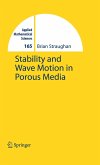Porous and Complex Flow Structures in Modern Technologies represents a new approach to the field, considering the fundamentals of porous media in terms of the key roles played by these materials in modern technology. Intended as a text for advanced undergraduates and as a reference for practicing engineers, the book uses the physics of flows in porous materials to tie together a wide variety of important issues from such fields as biomedical engineering, energy conversion, civil engineering, electronics, chemical engineering, and environmental engineering. Thus, for example, flows of water and oil through porous ground play a central role in energy exploration and recovery (oil wells, geothermal fluids), energy conversion (effluents from refineries and power plants), and environmental engineering (leachates from waste repositories).
Similarly, the demands of miniaturization in electronics and in biomedical applications are driving research into the flow of heat and fluids through small-scale porous media (heat exchangers, filters, gas exchangers). Filters, catalytic converters, the drying of stored grains, and a myriad of other applications involve flows through porous media.
By providing a unified theoretical framework that includes not only the traditional homogeneous and isotropic media but also models in which the assumptions of representative elemental volumes or global thermal equilibrium fail, the book provides practicing engineers the tools they need to analyze complex situations that arise in practice. This volume includes examples, solved problems and an extensive glossary of symbols.
Hinweis: Dieser Artikel kann nur an eine deutsche Lieferadresse ausgeliefert werden.
Similarly, the demands of miniaturization in electronics and in biomedical applications are driving research into the flow of heat and fluids through small-scale porous media (heat exchangers, filters, gas exchangers). Filters, catalytic converters, the drying of stored grains, and a myriad of other applications involve flows through porous media.
By providing a unified theoretical framework that includes not only the traditional homogeneous and isotropic media but also models in which the assumptions of representative elemental volumes or global thermal equilibrium fail, the book provides practicing engineers the tools they need to analyze complex situations that arise in practice. This volume includes examples, solved problems and an extensive glossary of symbols.
Hinweis: Dieser Artikel kann nur an eine deutsche Lieferadresse ausgeliefert werden.








